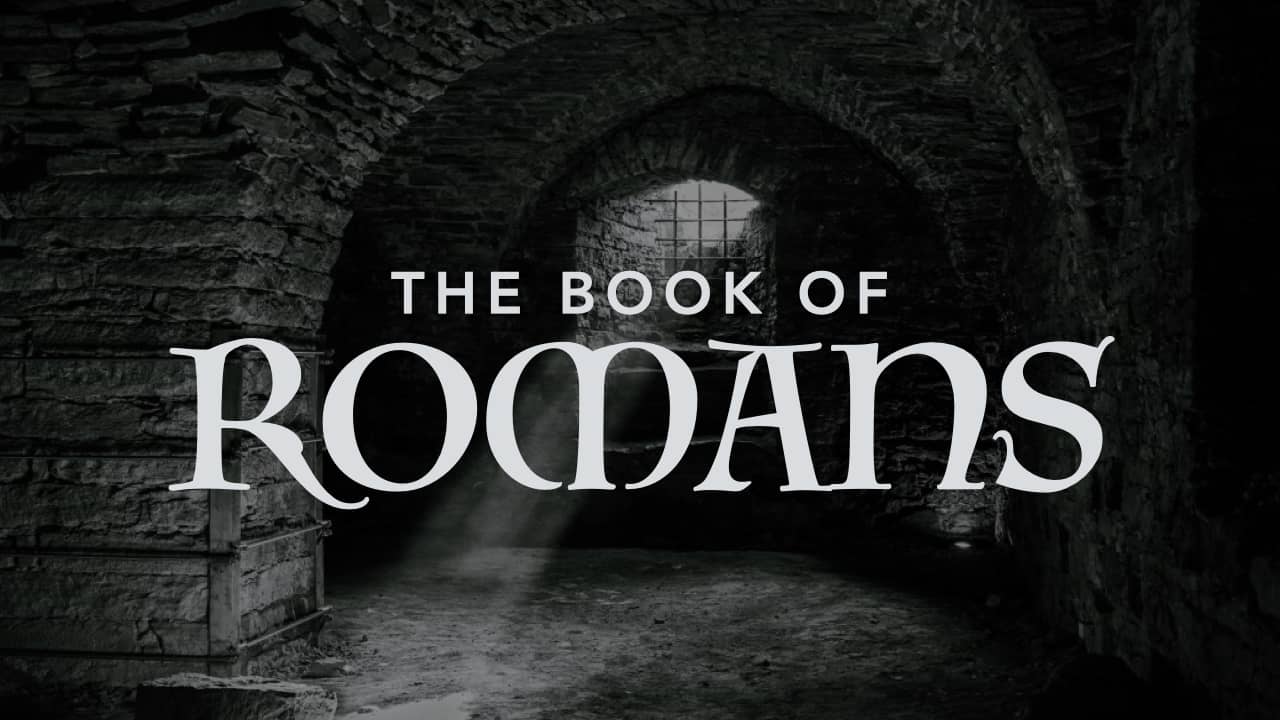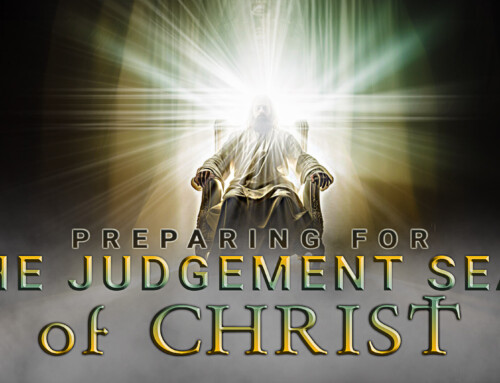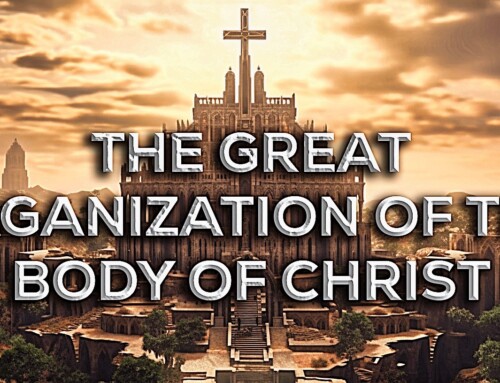THE BOOK OF ROMANS CHAPTER 1:1-17
THE RIGHTEOUSNESS OF GOD
Paul’s Introduction
Interestingly we have just completed our study of the Book of Hebrews, a Book addressed to Jewish Christians, and now we have begun a study on the Book of Romans, a Book addressed primarily to Gentile Christians (verse 13). The salutation or beginnings of both Books start similarly in their declarations of the Messiah; the Son of God, and the New Testament calling, through Him.
Verses 1:1-7 “Paul, a servant (slave) of Jesus Christ, called to be an apostle, separated unto the gospel of God, (Which he had promised afore by his prophets in the Holy Scriptures) Concerning his Son Jesus Christ our Lord, which was made of the seed of David according to the flesh; And declared to be the Son of God with power, according to the spirit of holiness, by the resurrection from the dead: By whom we have received grace and apostleship, for obedience to the faith among all nations, for his name (see Acts 15:14); Among whom are ye also the called of Jesus Christ: To all that be in Rome, beloved of God, called to be saints: Grace to you and peace from God our Father, and the Lord Jesus Christ.”
Paul, formerly Saul the Jewish Pharisee (Pharisee meaning set apart among the Jews), first introduces himself to these Romans, having never met them, and that as a slave, now a set apart one to his Lord Jesus Christ. His Calling as this slave was discovered on the road to Damascus, afterwards being appointed an Apostle (a sent one) to advocate the Good News of Jesus both Messiah and the Lord to the Nations.
The Message was not “Paul’s” Gospel…per se. As the prophets of old, and John the Baptizer had an understanding of the Gospel he is about to declare (that God would reveal the Messiah to both Jew and Gentile)…a scheme/plan God had devised even before the fall of man, and gradually had unfolded His Good News Plan over the first 4000 years up until the climax of Paul’s day. That which God had caused His prophets to not only preach but instructed to write down; these were/are the holy writings of the Old Testament, as they are inspired by God. So it is that Paul comes alongside all the earlier prophets to write and expound on the Gospel of Christ, the mortar or substance of this Letter. In fact ,much of this Letter is a running commentary on what the Prophets of Old wrote and did.
The mystery of the Gospel given to Paul (Hebrews 3:1; 1st Corinthians 2:7; Ephesians 3:5,9; Colossians 1:25-29), is that of the heavenly Kingdom calling to the New Man, primarily to Gentiles, to the end that they might co-rule with Jesus Christ the Lord. This is nowhere in this Epistle explicit, as it is beyond the scope and purpose of this Letter although alluded to in Romans 16:25,26. “Now to him that is of power to stablish you according to my gospel, and the preaching of Jesus Christ, according to the revelation of the mystery, which was kept secret since the world began, But now is made manifest, and by the scriptures of the prophets, according to the commandment of the everlasting God, made known to all nations for the obedience of faith: To God only wise, be glory through Jesus Christ for ever. Amen.” Paul’s gospel was not the fullness of the gospel of God. His part of the “good news” had to do with the mysterious calling unto the heavenly kingdom. His gospel went far beyond justification to what was held out for the sanctified, which was the hope of glory.
Verse 3 God’s Son being here declared as having two natures at His birth; human and Divine; declared God’s only begotten Son, manifest according to man’s nature; the Son of David. That is, to say in the flesh as the Son of Man in accordance to the seed of promise to be of the lineage of David. And manifest as the Son of God in power according to the “spirit of holiness” fully realized in His select Resurrection out from among the dead in Hades. He, being the first born from among the dead, ever. Neither man or spirit, none other has ever experienced this Resurrection, nor into the power of the indissoluble character of life. It is both the virgin womb and the empty tomb in that the Gospel declares the Son of Man and the Son of God.
The News reported among the World is about the World and the Worldly are occupied with it. But the Good News of God answers first to the weight of sin on the conscience of His created man who is fallen. It is the Good News of the Resurrected Son of man’s Redemption in power “…to the obedience of faith” that brings assurance of life eternal in the reception of the divine nature, and the future hope of Christ-like resurrection in glory. God’s first commandment of the New Testament is the obedience of faith in His Son. (See Luke 9:35 where Jesus was standing with Moses and Elijah and God said, “…This is my beloved Son: hear him.”) Obedience is commanded to His Son, whose complete name is Jesus (His name as the Son of Man) Christ (the 2nd Adam now Anointed by the Holy Spirit without measure) the Lord (not only the Savior but Lord/Master and Owner of those obedient to the faith); for the Gospel of Grace is followed by instructive commands. In that you can’t ignore Him and call Him Master. Faith “in” the Lord can only be expressed in obedience to Him, which is a completely different matter than the Commandments of Moses. PAUL did not preach obedience to the Law of Moses or to obey the 10 Commandments, but taught and exampled obedience in faith in and to the Lord. Paul’s Letter is addressed to the entire beloved (cared for) of God. They are addressed as not to be saints (‘to be’ is not in the Greek), but saints (saints being a title for the enrolled in Christ/that we are to live up to). These are the “saved” of Rome. Note that Paul prays grace and peace from God AND the LORD Jesus Christ.
Verses 8-15: “First I thank my God through Jesus Christ for you all, that your faith is spoken of throughout the whole world; For God is my witness, whom I serve with my spirit in the gospel of his Son, that without ceasing I make mention of you always in my prayers: Making request (entreating), if by any means now at length I might have a prosperous journey by the will of God to come unto you. For I long to see you, that I may impart unto you some spiritual gift, to the end ye may be established; That is, that I may be comforted together with you by the mutual faith both of you and me. Now I would not have you ignorant, brethren, that oftentimes I purposed to come unto you, (but was let hitherto,) that I might have some fruit among you also, even as among other Gentiles. I am debtor both to the Greeks, and to the Barbarians (uneducated; ignorant); both to the wise (educated), and to the unwise. So, as much as in me is, I am ready to preach the gospel to you that are at Rome also.”
Though Paul was not the apostolic founder of faith in Rome, he had for them as much a burden upon his heart as any other church that he had established, for it is written he had “…the care of all the churches” (2nd Corinthians 11:28). It is a mistake to think that Paul had any selfishly ambitious purpose in writing this Letter or for journeying to them. For he mentions his purpose in his desire to come to them; as being the comforting of one another in their mutual faith. It was solely to their benefit he was looking, in that He was one of a few Apostles that was endowed with the knowledge and wisdom of God and ability to communicate it, and with power to impart gifts to believers by the laying on of hands. He was (let, meaning) hindered for many years by work and persecution to travel there. He said ,“I am debtor (bound)”…to preach and minister the Gospel to all, and that he had a great desire to come to them, whenever it was the will of God, to do so.
PAUL BEGINS in Romans 1:16 and continues through Romans 8:39 showing doctrinally that both Jews and Gentiles are put on the same ground before God. (Apart from the Jews having been given precedent in receiving the oracles/revelations of God and the honor of Christ being born a Jew. Romans 9:4-5) Additionally it would be good to keep in mind also that the first 8 chapters can be divided up into two parts. The first 5 chapters are dedicated to doctrinal understanding on how God has dealt with sin, and the 2nd part (Chapters 6-8) are on how God has dealt with the sin nature (which will be pointed out in its proper place, but basically God deals with sin and leaves within us the sin nature for us to deal with).
It could be said that the next two verses are Paul’s ‘outline’ for the rest of the Epistle.
Verses 16-17 “For I am not ashamed of the gospel of Christ (if that is what they were thinking): for it is the power (dynamite) of God unto salvation (SOS, SOS, SOB {salvation of the spirit, salvation of the soul, and salvation of the body} from imprisonment in the illusion of this life) to every one (anybody; contrary to the doctrine of pre-destination) that believeth; (the hand of the soul) to the Jew first (being God’s precedent does not mean preference), and also to the Greek (Acts 17:23,31). For therein (His effective preeminence over all gods exhibited in the Resurrection of Christ) is the righteousness of God revealed from faith to faith (from a prisoner of the World to a watchmen for the Lord): as it is written, “The just shall live by faith.” [Habakkuk 2:4] Though Paul was not ashamed of the Gospel, more amazing is that God, Who needs us not at all, was not ashamed to give us the Gospel. The Gospel (God’s spel=story of euvangel/good news) was a farce to the Greek wisdom; something absurd, for which Paul suffered much ridicule. And to the Jew, the Gospel was a scandal, angering them to persecution and murder of those who received it. The gospel of God opened the door far wider to mankind than the Mosaic Covenant of Israel did.
Paul is laying the ground work in this first chapter to the all-inclusiveness of the Gospel of God, that God is the Creator Who shall be our Redeemer, and of the Redeemer who is Creator. This puts Jew and Gentile on the common ground of sinners in need of discovering the gift of God’s Righteousness in justification from sins, the provision of God unto eternal life received by faith in Jesus Christ’s substitutionary death on the Cross and Resurrection in power. It was Foolishness to the Greeks and a stumbling block to the Jew (1st Corinthians 1:23). The Jew has knowledge of God, but his knowledge only condemned him. Whereas the Gentile, Paul goes on to say, is a transgressor against his conscience, who is thereby condemned in his ignorance.
WHAT IS the RIGHTEOUSNESS of God? Righteousness (right-ness as opposed to wickedness-wrongness) is the attribute of Justice forever dwelling IN God, the Most High Judge. It is the standard of conduct God has revealed in the Law. Saul/Paul was about being righteous before a righteous God; and that in keeping God’s 613 Commandments. He discovered he was unable to keep them all (Romans 7), and so unable to attain unto God’s Righteousness, he stood frighteningly condemned before the Righteous God.
WHAT IS THE GIFT OF RIGHTEOUSNESS OF GOD? (Romans 5:1) It is something proceeding from God. The gift is the provision of righteousness for the unrighteous; something outside of God (like “the bread of God” “and the “armor of God”). The gift of righteousness of God is the righteousness of Jesus, in His willing yielding obedience from Heaven to Death on the Cross. It is the righteousness that can be only obtained by faith, as opposed to hopeless attempts in a righteousness obtained by the works of the Law of Moses.
The divine nature in rebirth of the spirit now communicated, is effectively the gift of righteousness of God, and becomes the saving seal of the blood on the doorposts. God’s Just Wrath being then settled, so also the threat of the eternal death angel. The one righteousness (the gift) answers to the other (His Attribute of Righteousness, demanding Judgment on all sin). Thus, the Believer is Justified, declared in the right; by the Most High through His Attributes of Loving Grace and Wisdom. How can God be right in making me right, a sinner, without Him being in the wrong? This was a great problem…Socrates said to Plato some 430 years or so before Christ was Born, “God may be able to forgive sin; but I do not see how?” The answer as to how was by punishing a righteous man for the sins of the unrighteous man. In this, God is Just and the Justifier of those who believe/have faith in Christ Jesus the Righteous One, the Lamb of God.
Paul in this bigger picture of “the righteousness of God” …the very heart of the Gospel, is to be seen from his reference in what is Written in the Book of Habakkuk, “…but the just live by faith”. This statement of God is set by Paul tacitly beside that of Ezekiel 18:9 where God had previously said that he who… “Hath walked in my statutes, and hath kept my judgments, to deal truly; he is just, he shall surely live, saith the Lord God.” This being the righteousness of keeping the Law; that righteousness which Paul declared to be impossible to attain unto. The noun ‘faith’ in Hebrew Old Testament means fidelity or faithfulness. That which was depicted in Aaron and Hur holding up the hands of faith until the victory was complete. Faith endures to the end, Faith is hanging on to God, Faith is keeping faith with God. “Where the faithfulness of God encounters the fidelity (state of faithfulness) of men, there is manifested His righteousness. There shall the righteous man live.” (Karl Barth)
The Word to Habakkuk was when the Babylonians invade; the righteous, those holding on to God, will still be found holding onto God when it passes. In Romans 1:17, Paul quotes, “the just shall live by faith”. Or it can be said that “by faith the just shall live”. (This statement is taken up 3 times in the New Testament, here and in Galatians and Hebrews.) Of course it has nothing to do with keeping the Laws of Moses, but by continuing in trust in Jesus’ Word in Scripture. Faith to faith means from the first to the last, not just the faith you had when you believed, not just the faith you have today, but faith to faith in the unseen to face all things seen righteously in rightness. Faith to faith is an indictment against falling back or staying static. Continuing faith to faith is not holding onto your believing in what Jesus did at your conversion, but faith afresh daily IN Him; as you do, say, and think what He directs as Master. To go on beyond your first believing; in the obedience of faith once only… to the obedience of faith always. The Just shall live on guard (not letting their guard down), by continuing on with an eye to the horizon, in growing, maturing faith in spite of the World’s contradicting circumstances set against an unseen righteous God. Hebrews 10:38 says, “…my righteous one will live by faith, BUT if any man draw back, my soul shall have no pleasure in him.
Habakkuk was that great prophet who argued with God about what is ‘right’; to whom God revealed His coming devastating judgment on Israel by the hand of the Babylonians. Habakkuk had a hard time in accepting that pending judgement as being in harmony with God’s calling of Israel as His people. He argued, in his reasoning, that the Babylonians would leave nobody and nothing alive, therefore surely this ferocious cruelty God would not allow. But God guaranteed He would, yet He also revealed that those justified by faith in Him would live in spite of the devastation. They are contrasted with those in pretense of keeping of the Law, those whose souls were lifted up in themselves.
A prayer of Habakkuk the prophet upon Shigionoth (a musical term). “O Lord, I have heard thy speech, and was afraid: O Lord, revive thy work in the midst of the years, in the midst of the years make known; in wrath remember mercy.” [Habakkuk 3:2] Habakkuk, in religious reasoning of the flesh (you could say the light of faith that he then had, and in that frame of mind God said you would not have believed me even if I had told you what I was doing) argued with God in the first chapter. In the 2nd Chapter, God then gives Habakkuk a vision to see and write upon a wooden fence where all that pass by could read the Vision and Word of Woe.
And in Chapter 3 we see the Holy Spirit has now come upon Habakkuk as he now has been shown and sees the vastness of God’s activities, and that included all nations. Habakkuk sees now the warrant and wisdom of God’s awful Wrath and now rather than argue, he pleads; O God in your “…wrath remember mercy.” And after feeling God’s heart under the influence of the Spirit, starting in verse 3 of Habakkuk 3, he takes up quill and records this song; “God came from Teman, and the Holy One from mount Paran. Selah. His glory covered the heavens, and the earth was full of his praise. And his brightness was as the light; he had horns coming out of his hand: and there was the hiding of his power. Before him went the pestilence, and burning coals went forth at his feet. He stood, and measured the earth: he beheld, and drove asunder the nations; and the everlasting mountains were scattered, the perpetual hills did bow: his ways are everlasting. I saw the tents of Cushan in affliction: and the curtains of the land of Midian did tremble. Was the Lord displeased against the rivers? — was thine anger against the rivers? — was thy wrath against the sea, that thou didst ride upon thine horses and thy chariots of salvation? Thy bow was made quite naked, according to the oaths of the tribes, even thy word. Selah. Thou didst cleave the earth with rivers. The mountains saw thee, and they trembled: the overflowing of the water passed by: the deep uttered his voice, and lifted up his hands on high. The sun and moon stood still in their habitation: at the light of thine arrows they went, and at the shining of thy glittering spear. Thou didst march through the land in indignation, thou didst thresh the heathen in anger. Thou wentest forth for the salvation of thy people, even for salvation with thine anointed; thou woundedst the head out of the house of the wicked, by discovering the foundation unto the neck. Selah. Thou didst strike through with his staves the head of his villages: they came out as a whirlwind to scatter me: their rejoicing was as to devour the poor secretly. Thou didst walk through the sea with thine horses, through the heap of great waters. When I heard, my belly trembled; my lips quivered at the voice: rottenness entered into my bones, and I trembled in myself, that I might rest in the day of trouble: when he cometh up unto the people, he will invade them with his troops. Although the fig tree shall not blossom, neither shall fruit be in the vines; the labor of the olive shall fail, and the fields shall yield no meat; the flock shall be cut off from the fold, and there shall be no herd in the stalls: Yet I will rejoice in the Lord, I will joy in the God of my salvation. The Lord God is my strength, and he will make my feet like hinds’ feet, and he will make me to walk upon mine high places. To the chief singer on my stringed instruments…” [Habakkuk 3:3-19]
The Jews believed and still believe that the righteousness of God is attained by keeping the Law, in that there is found their justification and assurance that God will let him that keeps the Law live and be blessed. Paul/Saul was raised up in this interpretation and was completely indoctrinated to this being the meaning of God’s Words to Habakkuk. That is until his conversion to Jesus Christ when he then saw the fullness of the meaning behind the prophet’s Words. The reality is that God’s justness was met by faith outside of the Law, as Paul will so richly reveal in Romans Chapter 3. But this humble faith in God’s Word, even by Abraham, accompanied by the shedding of an animal’s blood could not fulfill the fullness of God’s Salvation Plan. Certainly that Old Testament Grace of faith in God answers to acceptance into Paradise of Hades but never would or could answer to the mysterious Work of the Atonement of Jesus Christ the Lord. That being of saved men found righteously living who will be gloriously endowed in the resurrection, that they may enter into the very presence of the Father. “…conformed to the image of his Son, that He might be the firstborn among MANY brethren.” [Romans 8:29] And that by following the spirit/Spirit (our spirit yielding to the Holy Spirit). God’s New Testament application of those Words Written by Habakkuk “the just shall live by faith” or by faith the just shall live ….find their fullness of meaning and can reach their full potential only in the Gospel of continued growing faith, obedience after our first faith IN Jesus Christ the Lord is by the obedient following of the spirit of holiness. This theme of “the Righteousness of God revealed from faith to faith…” (Romans 1:17) although not the first purpose of the Letter, yet pervades the Epistle.





Leave A Comment